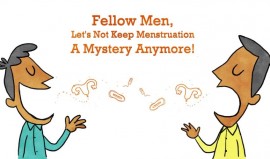"Men, Let's Talk About Menstruation"

Gender inequality is one of the underlying causes of the negligence of menstrual hygiene. As a result of unequal relations between men and women, female voices are unheard of in decision-making processes within households, communities, and development programs. They have led to cultural taboos, stigma, and shame around menstruation. There is a belief prevalent in many cultures that menstrual blood and menstruating women themselves are impure which has led to women and girls being fully engaged in social, educational, productive, and religious activities. In some cultures, they are even prohibited from entering the home as well. Therefore, the strategic and practical requirements of women and girls concerning menstruation and menstrual hygiene, and comprehensive programs that cover both genders should be effectively addressed. But from such programs, there is very little documentation on how to effectively engage men and boys in menstrual hygiene interventions.
Men and women are both integral to society, be it workspaces, schools, or colleges. Therefore, shying away from communicating about menstruation is not a solution. Unless men discuss menstruation, they won’t be able to talk about Menstrual Health Management (MHM). MHM requires an individual to have adequate menstrual hygiene facilities that include providing a clean private space for women to change their clothes, soap, and water to clean their private parts, and dustbins to dispose of their menstrual/sanitary waste. The lack of discussion on MHM shows another indication of gender inequality. These inequalities lead to different societal and cultural taboos, which further put restrictions on girls during periods. Thus, aggravating their difficulties and widening the disparity.
Multiple studies have shown that the attitudes of men are the ones driving these taboos and myths around menstruation. Thus, poor MHM knowledge, along with the oppressive societal norms for sexual and reproductive health has aggravated the gender disparities. Men’s role in menstruation can influence women’s experience, such as their positive role as husband, brother, father, teacher, peer, and policymaker can make a huge difference. Thus, men in any role must be involved in the ongoing discussions about menstruation.
Men and boys have equal stakes in Menstrual Health Management and could support in the following ways:
- Become advocates or change agents who dispel myths, misconceptions, and customs that promote menstrual discomfort, shame, and fear.
- Knowing and appreciating gender-biased vulnerabilities brought on by menstrual hormones, provide needed assistance.
- Understanding experiences differ from one person to another.
- Infrastructure and financial support are also important. Access to sanitary places (toilets) that offer privacy and security while providing appropriate supplies of water and soap as well as the purchasing power of menstruation products are essential in promoting effective MHM. Make a difference in the field of menstrual health and hygiene by promoting ecologically friendly, sustainable innovations that encourage the reuse or safe disposal of discarded menstrual products.
In conclusion, we can state that since men are typically the focus of the dominant discourse in society and MHM does not affect them, it is not discussed openly or given much weight by them. So, we need a story that shows how MHM is important for men as well. If we don't talk about it, men will continue being unaware of how their acts affect women's wellness.
